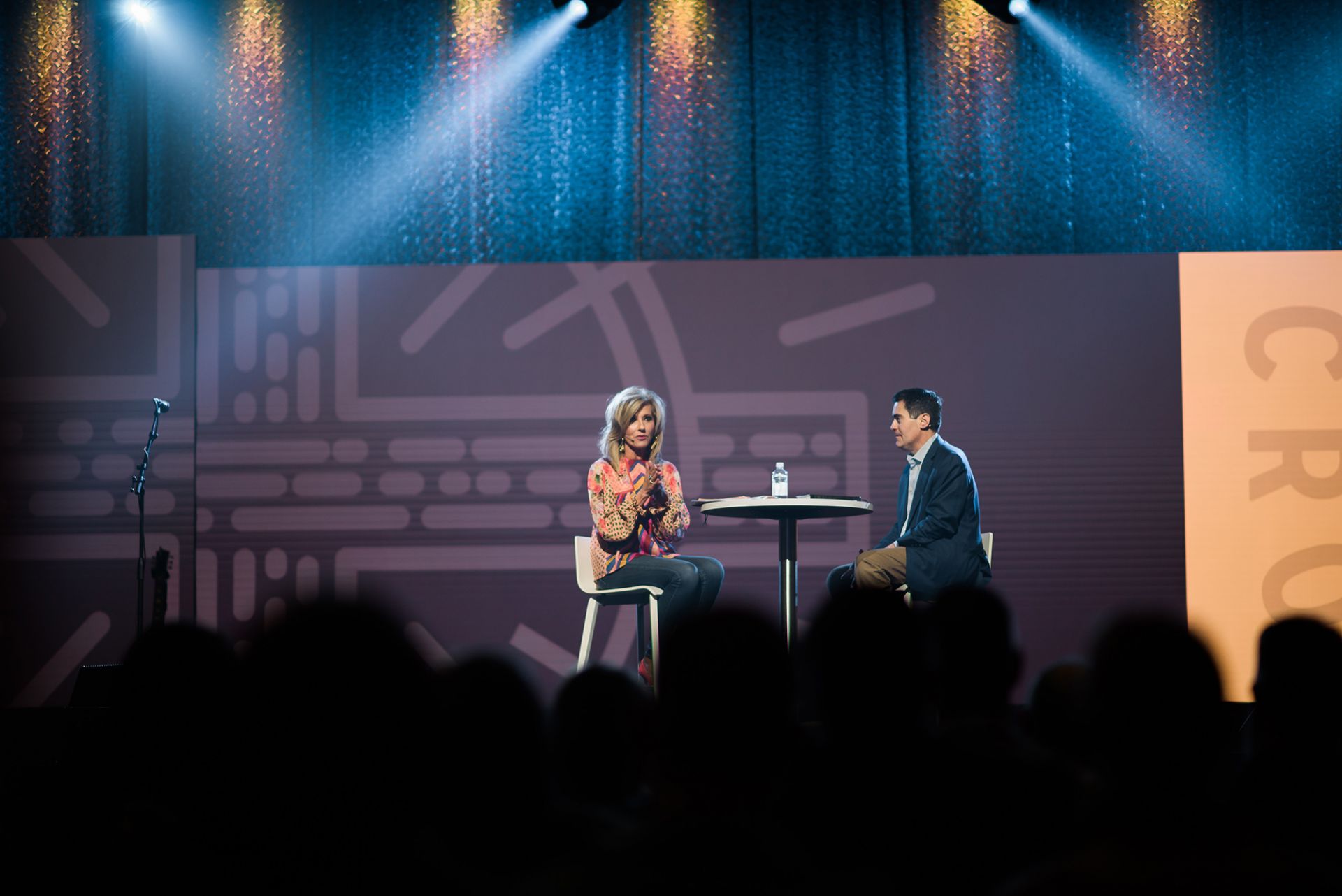
by Brian Hobbs | Dec 6, 2018
Glasses versus contacts. The Sooners or the Cowboys. Coke versus Pepsi. Some debates bring out stronger feelings than you might think.
I was reminded of one of those ongoing debates recently. Which is better? Real Christmas trees or artificial ones?
Growing up, our family had artificial trees. They are overall more inexpensive (especially when the cost is divided over several years). They are less mess, and in today’s market, you can get almost any style you want, lights and all.
These days, my family uses real Christmas trees. They look and smell great and are the real deal. You even get to experience of the thrill (but also the cost) of tree shopping each year. Some people I know even cut their own tree down.
Whether you prefer real or artificial trees, there is one thing that we all need to remember that is definitely real at Christmas. It’s the Christmas story itself, as told in the Gospels of Matthew and Luke.
I recently heard a preacher point out that the biblical narratives don’t begin with “Once upon a time…”
Instead, it begins with “In the time of Herod king of Judea there was…” (Luke 1:5), which proves the writer is rooting the narrative in history. In Christmas, as with all of Christianity, we have a faith that’s rooted in history and grounded in reality.
And that kind of authentic quality is the best of both worlds and the best kind of gift to remember at Christmas.

by Brian Hobbs | Nov 21, 2018
They’re everywhere. Small ones. Big ones. They demand our attention every day, including on days like Thanksgiving.
I’m talking about screens, these “glowing rectangles.” Yes, society is in a screens craze. From personal devices to flat screen TVs, there’s almost no way to get away from screens these days.
I do not need to quote studies for us to realize that screen time is taking a bigger bite out of our daily lives than ever. These tech devices have numerous perks, such as entertainment, commerce, means of communications and even physical fitness apps and prompts. Yet the drawbacks are significant, especially when it comes to relationships.
This means Christians must regulate better our attention span, so we are not drawn away from Scripture and prayer. It also means we need to focus better on the people around us, instead of staring at screens all day (You have my approval, by the way, to stop reading this blog on a screen right now and focus on the people around you).
Here are three ideas to help you this Thanksgiving to focus more on people than screens:
- Unplug. Thanksgiving is one of those times when a majority of people are off work. This is your chance to cease checking work email, calls and texts. Take one day this year to have your phone away from you.
- If looking at screens, do so as a group. From watching the Dallas Cowboys football game to going out to a movie, screens can be enjoyed as a group. If you are going to enjoy some screen time, this Thanksgiving, try doing so as a group instead of a collection of atomized individuals.
- Make it a habit. If less screens for you on Thanksgiving goes well, try making a habit of it. Whether one hour a day or one day a week, such as Sunday, make a habit of checking your personal screen device less often. Apple’s iPhone itself has come out with some helpful tools to regulate screen time behavior, as well as numerous other helps out there.
As Thanksgiving comes and go, let’s all give thanks for what God has placed in our lives and what’s most important. And let’s try to balance out screen time with “others time.” In so doing, I think we will be glad we did and give thanks for it, even beyond the holidays.

by Brian Hobbs | Nov 6, 2018
Forty years ago, the world heard about Louise Brown, the first “test-tube baby,” born by what was then a new “reproductive technology” called In Vitro Fertilization (IVF). Fast forward to today, and most families and communities personally know someone who has participated in IVF.
The rise and widespread practice of IVF—from Louise Brown to today—happened with relatively little discussion when compared to other issues. Yet it brings with it a whole host of ethical dilemmas and even some unintended consequences.
Consider a consequence being seen in the U.K., where according to a BBC report, the IVF rate is up while the adoption rate is down. To be specific, “In the last 40 years since the first ‘test-tube baby’ was born, adoptions in England and Wales have fallen by 62 percent. Meanwhile, IVF success rates for women under 35 have nearly tripled.”
What we see in our neighbors across the pond has implications for us in the United States, which can cause Christians to pause and reflect.
When dealing with hot topics like IVF, we must remember this is connected to couples, real women and men, who are experiencing the anguish of infertility. The infertility struggle can be devastating, affecting an estimated 10 percent of the population.
Thankfully, we serve a God who cares and sees the suffering of those who are infertile. In reading the Scriptures, we see that infertility is a topic that God cares about. Because we believe every life is sacred, we give thanks for everyone helped through infertility. Further, we give thanks for every child who has been conceived through IVF, knowing they are made in the image of God and have infinite worth and value (Gen. 1:27).
When issues surrounding infertility come up, it can be difficult for Christians to navigate. That is why I am thankful there are resources to help us, like a helpful new book, written by an Oklahoma Baptist University ethics professor Matthew Arbo. His book, Walking through Infertility: Biblical, Theological, and Moral Counsel for Those Who Are Struggling, is an ethics primer but also a pastoral guide.
Arbo’s book offers comfort and compassion for all those who struggle with infertility, providing hope and help on key issues ranging from adoption to IVF, foster care to medical treatments.
Regarding IVF, Arbo said in a recent interview, “There are a couple things I say in the book. One is for couples who are thinking about (IVF), then one for that couple that has already and who face other kinds of questions about what to do… It is important to realize that it isn’t a treatment; it is an option. We’re not treating the person; we are externalizing reproductive matter.
“There are some theological concerns about the disconnect between procreation and the sexual act between a man and a woman in a marriage covenant. It was the way it was designed by God. Although it is understandable why a couple might want to have a child of their own, it would be a mistake to pursue that course when the means of achieving it are questionable. There also is a back story to IVF. It required clinical research to refine its techniques. In refining those techniques, there was a destruction of hundreds of thousands of embryos, and that was an acceptance of the practice in order to refine the techniques of IVF.
“Another concern is enhanced risk. Any couple that procreates naturally accepts that. There are risks in that we don’t know. But with IVF there is an acceptance of an enhanced risk, with all the moving parts and the storage and personnel.
“Then lastly is the concern about unintended consequences. We don’t know sometimes what will happen. A couple could decide to have six or seven eggs fertilized in a clinic and have them stored and have a few children through that measure, then conceive naturally. They then have embryos still frozen, and they don’t know if they want to still have those children. That is an example of an unintended consequence. You can avoid that by not pursuing IVF. I have tried to do this in the right sort of tone and give a proper moral assessment. That is why I say I caution against (IVF).”
Today, as we mark the 40th anniversary of Louise Brown, let’s thank God for her life and for every single person conceived through IVF, as well as for every couple helped through infertility.
Meanwhile, we can take time to reflect further about the ethics and consequences of this reproductive technology that, four decades ago surprised the world and that is still with us every day.

by Brian Hobbs | Oct 17, 2018
I recently attended the 2018 Ethics & Religious Liberty Commission’s national conference, “The Cross-Shaped Family.” The event, which drew nearly 1,000 attendees and countless more online, was one of the more powerful events I have attended.
From Russell Moore to Beth Moore to Matt Chandler, the conference had an all-star lineup of speakers. The format included sermons, speeches, expert panels, video messages and more, each speaking to family life and the church.
Only this was not your ordinary marriage retreat or event about family that would focus almost exclusively on married couples. The ERLC event broke the mold, offering help and hope, no matter your age or life stage.
Below were some memorable lines from the event.
On Singleness
“Being single should not mean being lonely. If it does, then we are not being the kind of church the New Testament calls us to be… If you have to be in a romantic relationship to experience friendship and community in your church, then your church stinks.”
–Sam Allberry
On The Cross & Family
“Unless we see that the Christian life is defined by the cross, then we are going to fall for the devil’s offers because we are going to expect our families to bear a burden they cannot bear. Instead though, if you ground your identity and your inheritance not in your family but in the cross, if you see yourself as crucified with Christ, if you – as Jesus tells us – find your lives only by losing them, then you are actually freed to love your family.”
–Russell Moore
On Marriage
“Your marriage in the world today is as sacred in the sight of God as the perfect marriage of Adam and Eve back in the garden. (God) thinks your marriage is worth fighting for… Every marriage has problems. We’re really not very good at it. But marriage itself is not a problem. According to Genesis 2, God gave us marriage as a remedy.”
–Ray Ortlund
On Kid-Centered Families
“We cannot teach our kids to give their lives away for the Gospel when all they see is us giving away our lives for them.”
–Jamie Ivey
On Addressing Sexual Abuse
“When it comes to sexual abuse and sexual assault, we cannot move straight to solutions without first starting with sorrow.”
–Phillip Bethancourt
On What Matters Most
“Everything else may fall apart, but Jesus will always come through.”
–Beth Moore
In addition to these, there were many other noteworthy comments, insights, thought gems and messages from God’s Word. In coming weeks, the ERLC will share videos from the event at www.erlc.com.
In the meantime, check out Dr. Moore’s newest book, The Storm-Tossed Family. This conference and his book have come along at a time when we desperately needed it; and, I confess, at a time when I desperately needed it.

by Brian Hobbs | Oct 10, 2018
I was recently told Hallmark Channel’s “Countdown to Christmas” begins Oct. 26. This news brings excitement and dread to numerous people I know, and it is symbolic of a larger trend I want to discuss.
The first group of excited people are typically those who love anything Christmas at any time. It could be the dead of summer, and they want to hear music about Chestnuts roasting on an open fire. Like that or not, there’s something about this group’s dedication to Christmas you have to admire at some level.
The next excited group about the “Countdown to Christmas” includes those who simply love Hallmark’s holiday movies, especially the feelings they bring about. Even those who do not thrive upon the romantic plotlines, many people like that Hallmark harkens to a Thomas Kinkade-like world, where good always triumphs over evil, and where guys always say and do the right thing.
Some of the people I know who groan at this earlier “Countdown to Christmas” do so because they simply dislike Hallmark movies. This is typically either due to personal taste or just having been overexposed to them, in which all the movies seem alike.
Still others groan at this news because the start of the Christmas season keeps creeping further back. It’s this latter element I wish to address at some length.
Part of our mass calendar confusion comes from the fact that we are living in a society that does not know what to do with holidays. Large elements of society want to make nothing of holidays. Others want to have culture wars over every holiday. Still others want to pick and choose what holidays should be recognized. Take Columbus Day, a secular holiday that has fallen on hard times; very few know what to do about a day like that.
To put the issue in context, the Christmas season began with the liturgical season of Advent, which is typically the last Sunday in November (after Thanksgiving). Now, we are starting the Christmas festivities prior to Halloween (or Reformation Day or All Hallows’ Eve, depending on your denomination’s calendar). In the traditional sense, Christmas is starting earlier than ever.
To offer a different perspective, I am someone who gets annoyed, not when Christmas celebrations start too early, but when they end too early. I am troubled over people who have the Christmas lights packed up before Dec. 25 is even over.
The familiar holiday song “The 12 Days of Christmas” relates to December 25 and the 11 days after. In a liturgical calendar, you do not stop celebrating Christmas on December 25. You keep going for 12 days, until the time we remember that the wise men found Jesus. That being said, I am just thankful that any people are excited to celebrate Christmas.
That is because we recognize that Christmas is one of those holidays that has become viewed as secular but has major sacred implications. While we never want Christmas to become merely a commercial enterprise, it is encouraging that even those who celebrating it without thinking about Jesus are unwittingly celebrating the Incarnation and Virgin Birth of the Son of God, celebrating “God With Us.”
Like it or not, the “Countdown to Christmas” is here, and we can take heart that the promises and truth about Christmas continues to be relevant at every time of the year.




